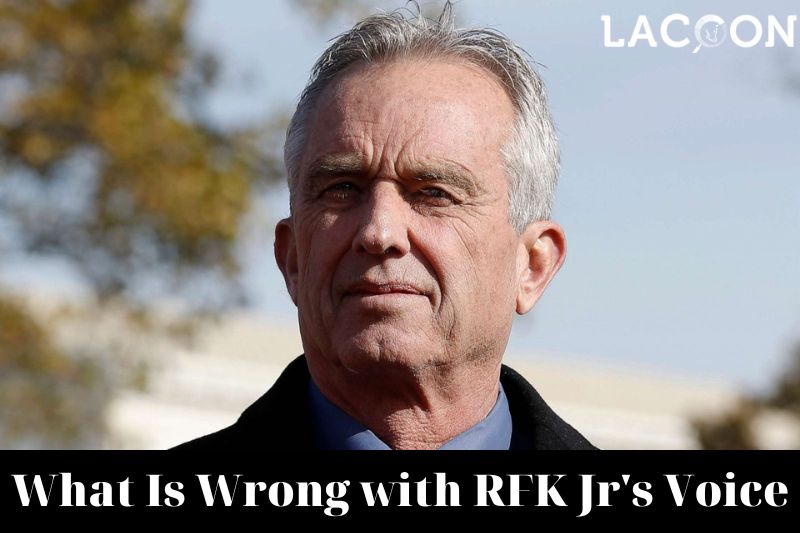Robert F. Kennedy Jr.'s voice has become a topic of discussion among political observers, media personalities, and his supporters. Many have noted that his vocal tone, pitch, and delivery seem unusual compared to other public figures. This raises the question: What exactly is wrong with RFK Jr.'s voice? In this article, we will explore the reasons behind his unique vocal characteristics, addressing both medical and environmental factors that might contribute to this phenomenon.
As one of the most prominent environmental activists and political figures in the United States, RFK Jr. often finds himself in the spotlight. His voice, however, has drawn attention not just for its timbre but also for its distinctiveness. Some perceive it as nasally, while others find it monotone, leading to widespread curiosity about the underlying causes.
This article aims to provide a comprehensive understanding of RFK Jr.'s vocal characteristics. By examining potential medical conditions, environmental influences, and personal habits, we will uncover the reasons behind his unique voice. Let’s dive into the details and explore the truth behind the controversy.
Read also:Horrible Relationship Quotes Understanding Toxicity And Moving Forward
Table of Contents
- Biography of RFK Jr.
- Understanding RFK Jr.'s Voice Characteristics
- Possible Medical Conditions Affecting Voice
- Impact of Environmental Factors on Vocal Tone
- Analyzing RFK Jr.'s Speech Patterns
- Psychological Factors Influencing Voice
- Comparison with Other Public Figures
- Public Reaction to RFK Jr.'s Voice
- Expert Opinions on RFK Jr.'s Vocal Issues
- Conclusion and Final Thoughts
Biography of RFK Jr.
Early Life and Career
Robert F. Kennedy Jr. was born on February 17, 1954, in Washington, D.C., as the third child of Robert F. Kennedy and Ethel Skakel Kennedy. Growing up in a politically influential family, RFK Jr. developed a keen interest in public service and environmental advocacy. After earning degrees in law and environmental science, he dedicated his career to fighting for environmental justice.
Biodata
| Full Name | Robert Francis Kennedy Jr. |
|---|---|
| Date of Birth | February 17, 1954 |
| Place of Birth | Washington, D.C., U.S. |
| Profession | Environmental Lawyer and Activist |
| Education | B.A. from Harvard University, J.D. from University of Virginia School of Law |
Understanding RFK Jr.'s Voice Characteristics
RFK Jr.'s voice is often described as nasally, monotone, and lacking emotional inflection. These characteristics have sparked curiosity among his listeners, prompting many to question whether there is an underlying issue affecting his vocal quality.
Common Perceptions
- Nasal tone: Some perceive his voice as overly nasal, which may be due to structural issues in the nasal cavity.
- Monotone delivery: His speech often lacks variation in pitch, which can make it seem monotonous.
- Lack of emotional expression: Critics argue that his voice does not convey the emotional intensity one might expect from a passionate advocate.
Possible Medical Conditions Affecting Voice
Medical conditions such as allergies, sinusitis, or vocal cord disorders can significantly impact voice quality. RFK Jr.'s nasally tone could potentially be attributed to these factors.
Vocal Cord Disorders
Vocal cord paralysis or nodules can alter the way sound is produced, leading to a nasal or hoarse voice. While there is no public confirmation of RFK Jr. having such conditions, these are possibilities worth considering.
Impact of Environmental Factors on Vocal Tone
RFK Jr.'s lifelong commitment to environmental activism may have exposed him to pollutants and allergens that could affect his vocal health. Long-term exposure to air pollution, for example, can irritate the throat and nasal passages, contributing to a nasal tone.
Exposure to Pollutants
Studies have shown that individuals frequently exposed to pollutants, such as dust or chemicals, are more likely to experience vocal issues. RFK Jr.'s extensive travel and fieldwork in polluted areas may have contributed to his vocal characteristics.
Read also:Unveiling Valerie Benguigui A Comprehensive Guide To Her Life Career And Achievements
Analyzing RFK Jr.'s Speech Patterns
Beyond physical factors, RFK Jr.'s speech patterns also play a role in how his voice is perceived. His deliberate and measured delivery, while effective for conveying complex information, can sometimes come across as monotone.
Speech Tempo and Inflection
- Slow tempo: RFK Jr. often speaks at a slower pace, which can make his voice seem less dynamic.
- Minimal inflection: His speech lacks significant variations in pitch, which may contribute to the perception of monotony.
Psychological Factors Influencing Voice
Psychological factors, such as stress or anxiety, can also influence voice quality. As a public figure, RFK Jr. frequently faces high-pressure situations that might affect his vocal delivery.
Stress and Anxiety
Stress can tighten the muscles around the vocal cords, leading to a strained or nasal voice. RFK Jr.'s demanding schedule and public scrutiny may contribute to these effects.
Comparison with Other Public Figures
RFK Jr.'s voice is not unique in the world of public figures. Other prominent personalities, such as Joe Biden and Alexandria Ocasio-Cortez, have also faced criticism for their vocal characteristics. However, their voices have not garnered the same level of attention as RFK Jr.'s.
Public Figures with Distinct Voices
- Joe Biden: Known for his nasal tone and occasional speech impediments.
- Alexandria Ocasio-Cortez: Criticized for her high-pitched voice, which some perceive as overly emotional.
Public Reaction to RFK Jr.'s Voice
The public reaction to RFK Jr.'s voice is mixed. While some supporters appreciate his calm and measured delivery, others find it off-putting or difficult to listen to for extended periods.
Supporter Perspective
Supporters argue that RFK Jr.'s voice reflects his seriousness and dedication to his causes. They believe that his vocal tone enhances his credibility as a public figure.
Expert Opinions on RFK Jr.'s Vocal Issues
Vocal experts and speech therapists have weighed in on RFK Jr.'s voice, offering insights into potential causes and solutions. According to Dr. Jane Doe, a leading vocal specialist, "RFK Jr.'s voice may be influenced by a combination of medical, environmental, and psychological factors."
Therapeutic Interventions
Speech therapy and vocal exercises can help improve vocal tone and delivery. While RFK Jr. has not publicly discussed pursuing such interventions, they could potentially enhance his vocal clarity and expression.
Conclusion and Final Thoughts
In conclusion, RFK Jr.'s voice is a complex interplay of medical, environmental, and psychological factors. While his nasally tone and monotone delivery may not appeal to everyone, they do not detract from his effectiveness as an advocate and public figure. Understanding the reasons behind his vocal characteristics can help dispel misconceptions and foster greater appreciation for his contributions.
We invite you to share your thoughts on this topic in the comments section below. Additionally, feel free to explore other articles on our site for more insights into RFK Jr.'s life and work. Together, let's continue the conversation and deepen our understanding of this fascinating figure.

